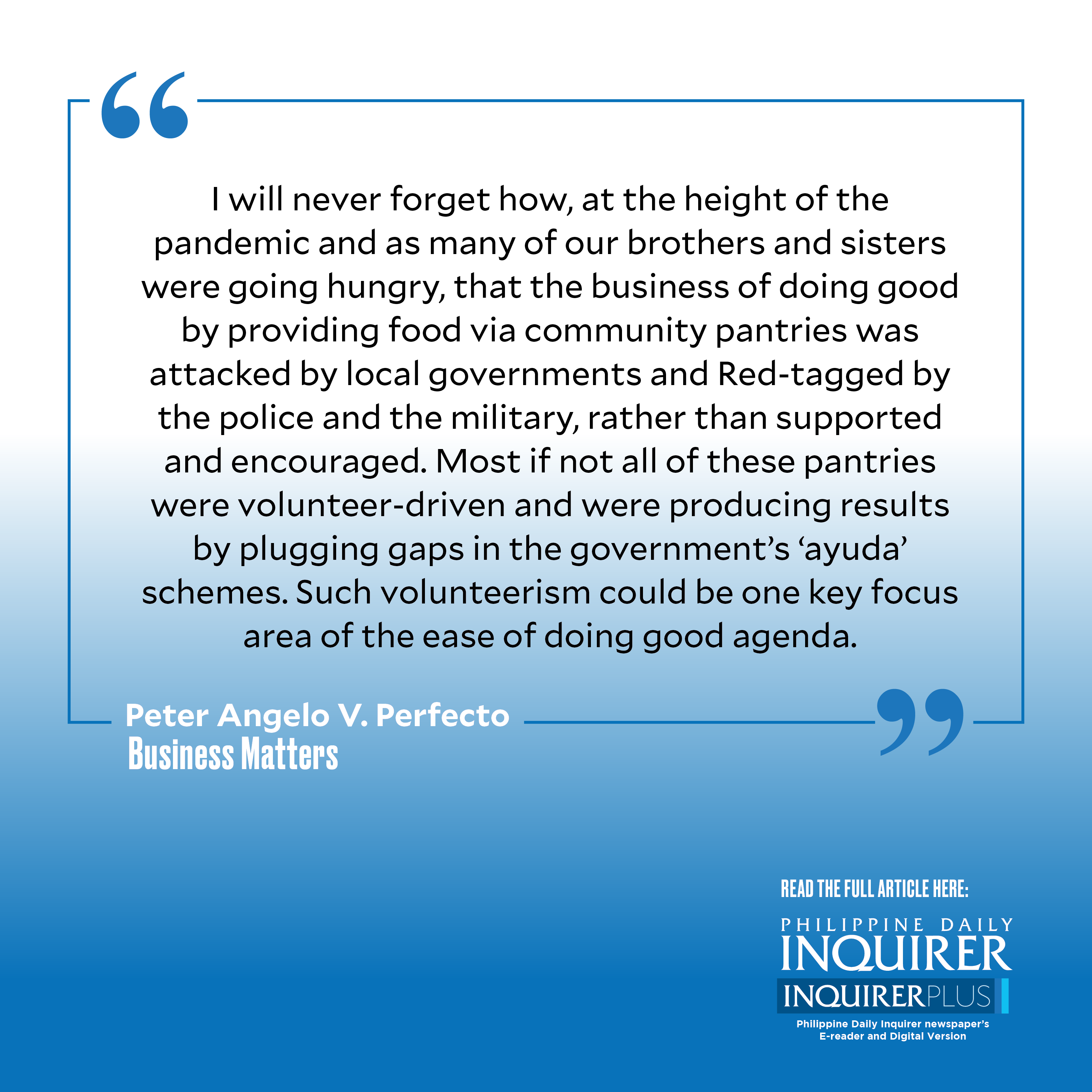The ease of doing good

I had the opportunity to attend the Association of Foundations’ (AF) 51st General Assembly on May 26, and listen to the keynote speech of Department of Social Welfare and Development (DSWD) Secretary Rex Gatchalian. He discussed ongoing efforts to streamline and even digitize processes related to the registration, licensing, and accreditation of nongovernment organizations (NGOs) and nonprofit ones.
The secretary repeatedly acknowledged the significant role played by NGOs, and this is what I would like to focus on in this article. I take a pause here to share the advocacy of Simon Sinek, British-born American author and inspirational speaker, who encourages the sector to adopt the term “for impact organizations” instead to better represent what the organizations contribute to society. Nongovernment or nonprofit simply does no justice to the kind of work that these organizations do, often at costs far less than what would have been incurred by government with the same or even better results. The association has over 200 for impact organizations all over the Philippines, and quite a number of them were present to listen, share, and engage with peers in the business of doing good.
Joining one of the breakout groups, I realized that the continuing advocacy of the Makati Business Club and other business groups for the ease of doing business must have a similar joint initiative among for impact organizations, and can be called the ease of doing good. When Guillermo Luz led the National Competitiveness Council, he advanced the ease of doing business agenda by setting up multisectoral committees that focused on key strategic focus areas like legislation, the judiciary, key executive departments like customs and internal revenue (BIR), local governments, as well as key sectors and industries encountering obstacles. Methinks that the AF, League of Corporate Foundations (LCF), CODE-NGO, and the Philippine Council for NGO Certification should do no less and come together, adopt a single framework, agenda and strategy, and push forward the ease of doing good in this country.
Part of the success of the National Competitiveness Council was the fact that it was jointly led and organized by the public and private sectors, with the Department of Trade and Industry as the government partner, that also provided resources like an executive director and other staff support. Secretary Gatchalian may wish to look into this model and make the DSWD the public sector lead, together with either the AF or LCF.
The ease of doing good is not just about processing issues with the DSWD. Organizations also encounter problems with local governments, the BIR, the military and police, and, yes, even the business sector. Hence, we need an effective and continuing platform to address the obstacles and blocks thrown the way of for impact organizations that should be partners in building a better Philippines.
I will never forget how, at the height of the pandemic and as many of our brothers and sisters were going hungry, the business of doing good by providing food via community pantries was attacked by local governments and Red-tagged by the police and the military rather than supported and encouraged. Most if not all these pantries were volunteer-driven and were producing results by plugging gaps in the government’s “ayuda” schemes.
Such volunteerism could be one key focus area of the ease of doing good agenda. We should set up nonpolitical systems and schemes to encourage more volunteerism, and create synergies to maximize the spirit of volunteerism that we all know is alive and well in the hearts and minds of most Filipinos. Much more can be done by an ease of doing good council.
This makes total business sense because if we can multiply the impact of these organizations by maximizing their resources and making more efficient use of the passion and dedication of tens of thousands in the work force of doing good in this country, we accelerate our ability to achieve global sustainable goals, including fighting poverty, hunger, and the education crisis.
—————-
Peter Angelo V. Perfecto, former executive director of Makati Business Club, works with the Phinma group and chairs Oxfam Pilipinas. Email: pvperfecto@gmail.com.
—————-
Business Matters is a project of Makati Business Club (makatibusinessclub@mbc.com.ph).




















